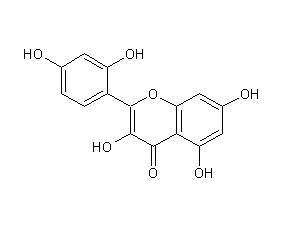
Structural formula
| Business number | 051T |
|---|---|
| Molecular formula | C15H10O7.xH2O |
| Molecular weight | 302.24 |
| label |
2-(2,4-dihydroxyphenyl)-3,5,7-trihydroxy-4H-1-benzopyran-4-one, Morin, Food antioxidants. |
Numbering system
CAS number:480-16-0
MDL number:None
EINECS number:207-542-9
RTECS number:LK8749000
BRN number:None
PubChem ID:None
Physical property data
1. Properties: Morin is a flavonoid derivative, which is light yellow or yellow needle-like crystals or amorphous powder.
2. Density (g/m3, 25/4℃): Undetermined
3. Relative steam density (g/cm 3, air = 1): Undetermined
4. Melting point: 299~300℃ (decomposition)
5. Boiling point (ºC, normal pressure): Undetermined
6. Boiling point (ºC, 5.2kPa): Undetermined
7. Refractive index: Undetermined
8. Flash point (ºC): Undetermined
9. Specific rotation (º): Undetermined
10. Autoignition point or ignition temperature (ºC): Undetermined
11. Vapor pressure (kPa, 25ºC): Undetermined
12. Saturated vapor pressure (kPa, 60ºC): Undetermined
13. Heat of combustion (KJ/mol): Undetermined
14. Critical temperature (ºC): Undetermined
15. Critical pressure (KPa): Undetermined
16. Oil-water (octanol/water) partition coefficient Log value: Undetermined
17. Explosion upper limit (%, V/V): Undetermined
18. Explosion lower limit (%, V/V): Undetermined
19. Solubility: slightly soluble in hot water and alkaline aqueous solution, soluble in ethanol, yellow or orange under alkaline conditions, and changes color when exposed to iron ions.
Toxicological data
1. Acute toxicity: Mouse intraperitoneal LD50: 555mg/kg, behavior – lethargy (common depressive activity), muscle weakness, lungs, respiratory depression;
2. Mutagenicity data: microbial organisms TEST system mutation: Bacteria – Salmonella typhimurium: 250ug/plate
Microorganism TEST system mutation: Bacteria-Salmonella typhimurium: 166nmol/plate
DNA damageTEST system :Rodent-mouse liver: 10 umol/L
Ecological data
This substance may be harmful to the environment, and special attention should be paid to water bodies.
Molecular structure data
1. Molar refractive index: 73.31
2. Molar volume (cm3/mol): 167.9
3. Isotonic specific volume (90.2K ):549.9
4. Surface tension (dyne/cm): 114.8
5. Polarizability (10-24cm3) :29.06
Compute chemical data
1. Reference value for hydrophobic parameter calculation (XlogP): None
2. Number of hydrogen bond donors: 5
3. Number of hydrogen bond acceptors: 7
4. Number of rotatable chemical bonds: 1
5. Number of tautomers: 366
6. Topological molecular polar surface area 127
7. Number of heavy atoms: 22
8. Surface charge: 0
9. Complexity: 488
10. Number of isotope atoms: 0
11. Determine the number of atomic stereocenters: 0
12. Uncertain number of atomic stereocenters: 0
13. Determine the number of chemical bond stereocenters: 0
14. Number of uncertain chemical bond stereocenters: 0
15. Number of covalent bond units: 1
Properties and stability
Use and store according to specifications, no decomposition will occur, and avoid contact with oxides
Storage method
Food grade plastic bag coated with kraft paper bag sealed packaging. Store in a cool and dry place.
Synthesis method
It is obtained by soaking and extracting the roots or woody parts of yellowwood trees with ethanol and then refining them.
Purpose
Can be used as food antioxidant.

 微信扫一扫打赏
微信扫一扫打赏

